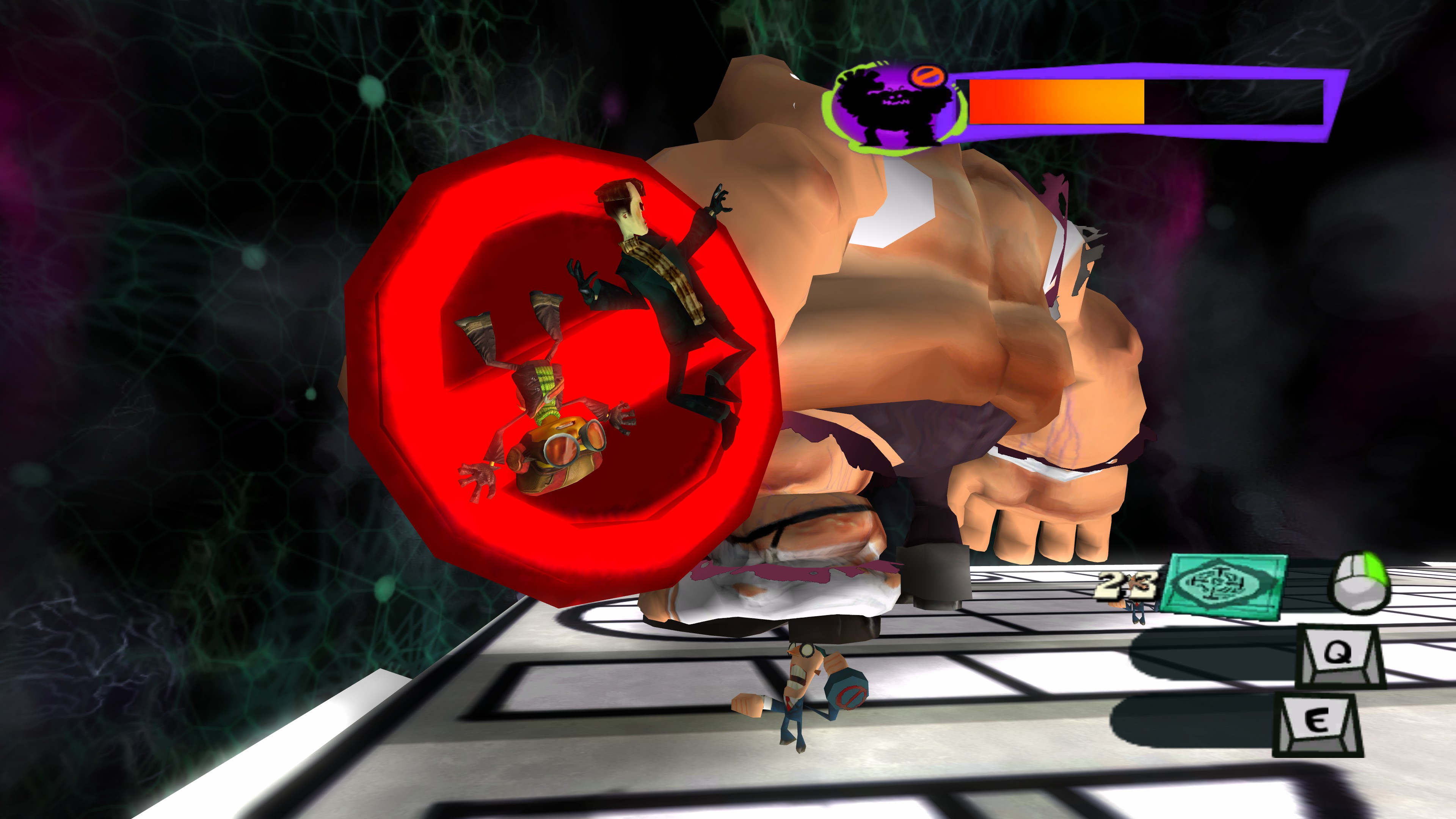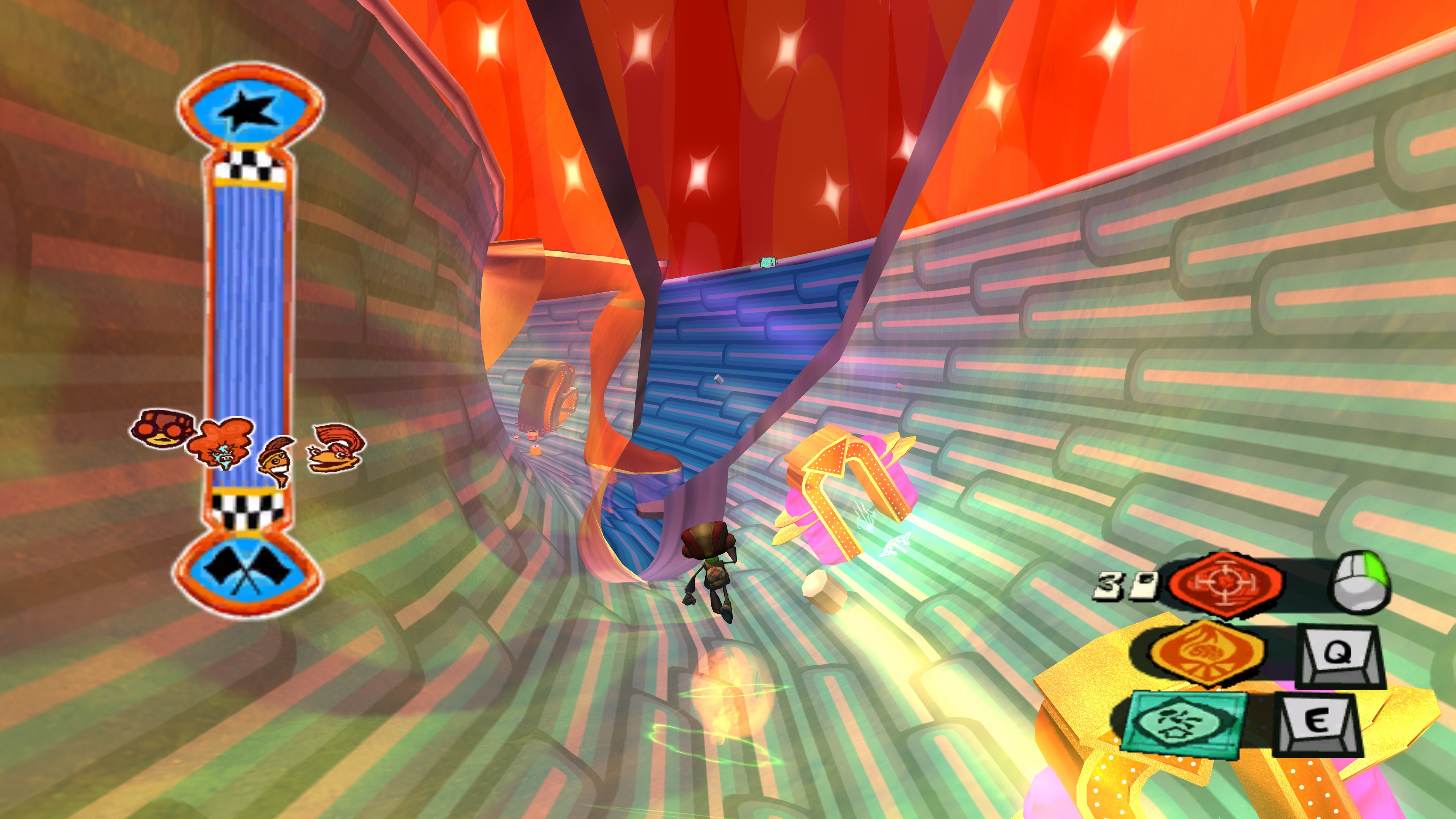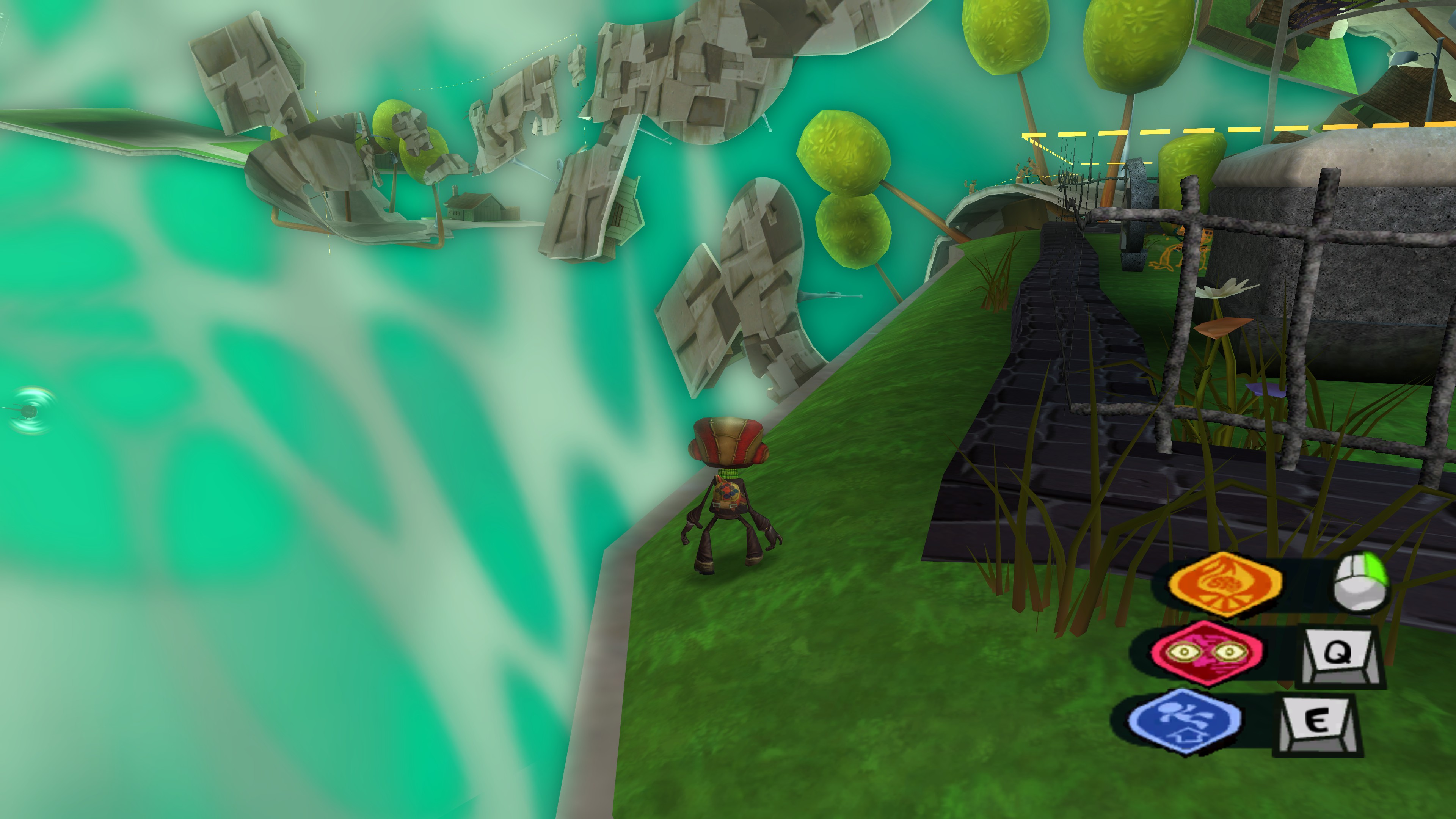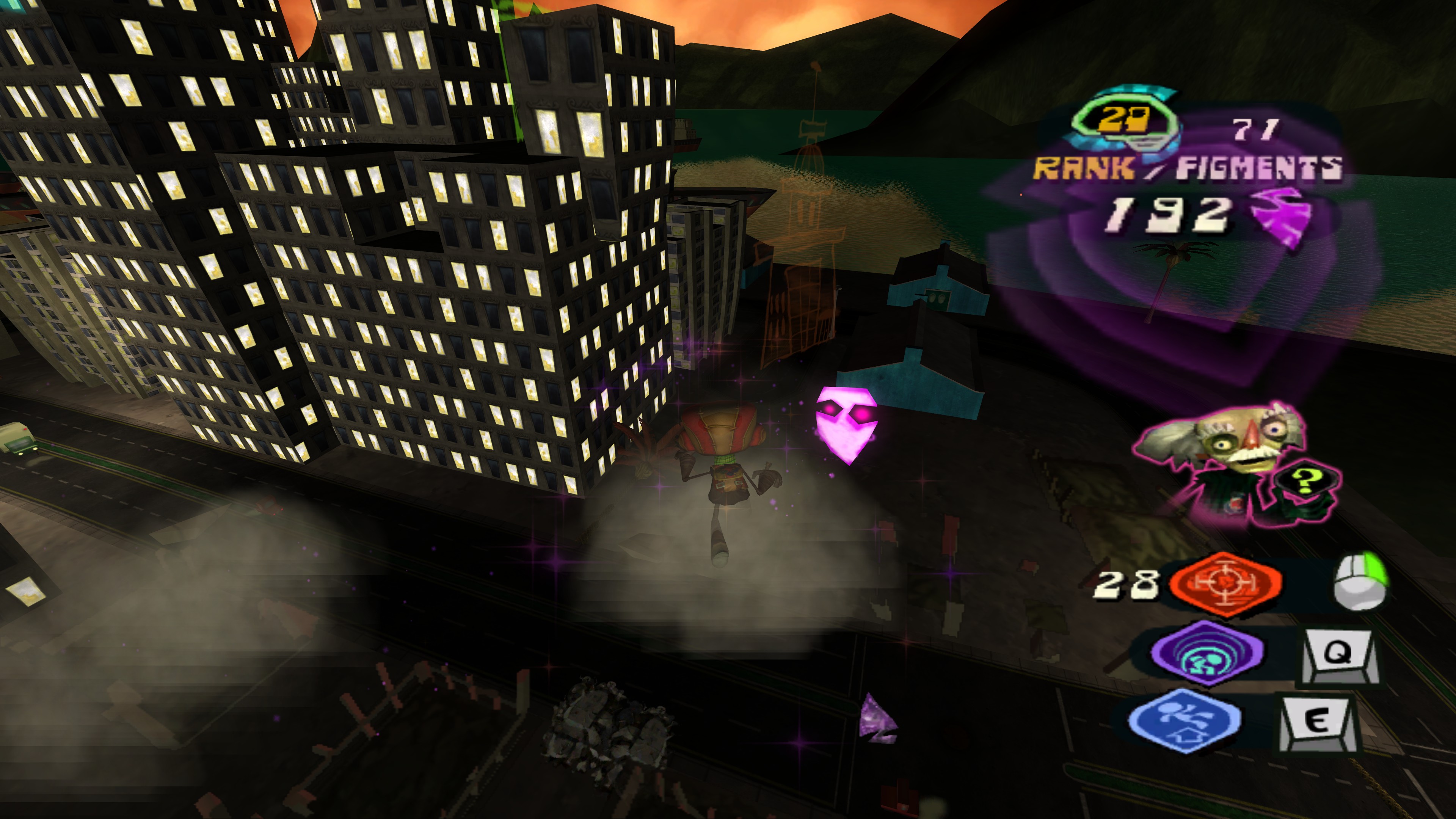Should you play Psychonauts before Psychonauts 2?
After what seems like millennia, Psychonauts 2 has finally launched, and is utterly delightful according to Matthew's review. But with 16 years separating Psychonauts and its sequel, there's a fair chance that you haven't played the first game in a long time, or possibly haven't played it at all.
I was in the first boat, and decided to quickly blast through the original before jumping into Psychonauts 2 this weekend. Only, it didn't quite work out as I'd planned. I'd hoped for a fun, nostalgic time reacquainting myself with Raz and the gang. Instead, Double Fine's debut left some complex thoughts rolling around my noggin like a small yellow child on an energy ball.
If you've never played Psychonauts before, here's the lowdown: You play as Raz, a circus runaway with psychic powers who intrudes upon a summer camp for children that are similarly gifted. The camp is run by the Psychonauts, an organisation that's essentially International Rescue for the mind, able to infiltrate a person's head-sponge and feng-shui their thoughts, sorting out emotional baggage and cleaning up mental cobwebs. Raz joins the camp's 'basic braining' course, before becoming embroiled in a larger adventure when an evil dentist named Doctor Loboto starts stealing children's brains.

To be honest, my own memories of Psychonauts were not completely positive. Specifically, I recalled that it had fantastic writing but terrible platforming. As it turns out, neither of these memories were wholly accurate. Far from being terrible, the platforming is largely enjoyable. It's a little scrappy compared to, say, the Uncharted series, but it's nothing like as clumsy as the original Tomb Raider games, or as wilfully fiendish as Crash Bandicoot. It has some neat little mechanics too, such as the rail-sliding and the levitation ability, the latter of which sees Raz rolling, bouncing and floating around on an orange ball of mental energy.
On the flipside, although the script is good, it isn't 'rushing to hospital with a ruptured diaphragm' good. There are some amusing jokes about lake monsters and exploding heads, alongside many more quietly chucklesome moments. But in general, Psychonauts is more charming than it is hilarious, boasting lots of kooky characters and an ineffably upbeat tone, as well as one of gaming's most likeable protagonists in Raz. The poor wee fella just wants to be a Psychonaut, damnit!
Indeed, the main draw of Pyschonauts is not its jokes and wit, but its broader concepts. Away from the main campground, which is a small, prototypical open world, most of the action takes place inside the minds of various characters. Each of these is a wildly imaginative representation of that person's headspace. Take the Psychonauts' two chief agents, Sasha Nein and Milla Vodello. Sasha's brain is a simple black-and-white cube that is perfectly orderly even when Raz seemingly opens it up to chaos. Milla's mind meanwhile, is a psychedelic party-scape, a twisting, looping purple space filled with disco lights and floating flowers.

Psychonauts also really runs with its ideas. An encounter with a giant, stupendously ugly lungfish is set-up like a typical boss fight. But after the battle, Raz then enters its brain, transporting him to a Bikini Bottom-like piscine metropolis, with Raz playing the role of a destructive Kaiju referred to as "Goggalor", smashing entire houses with his fists and climbing skyscrapers like King Kong. This is followed immediately by Psychonauts' most famous sequence, the Milkman Conspiracy. Entering the brain of a paranoid asylum security guard, Raz finds himself in a twisted, gravity-defying American suburb prowled by incompetent secret agents who literally don't know one end of a rifle from the other. What follows is an elaborate object-finding puzzle as Raz tries to beat the agents in locating the mysterious Milkman.
Sixteen years on, the extent of Psychonauts' inventiveness remains astonishing. It always has a new trick up its sleeve, some daft aside or high fallutin' concept designed specifically to put a smile on your face. Sometimes though, Psychonauts does exactly the opposite. While it is frequently colourful and clever, structurally it can be oblique and frustrating, hiding important information and arbitrarily hindering player progress.
Your abilities and equipment, for example, aren't simply picked up as you progress through the game. Some are unlocked when you reach a certain "rank", while others must be purchased with a currency known as arrowheads. The game doesn't tell you what powers you need at what stage, it just assumes that you'll have unlocked them by the time you need them. This means you can walk into a level like the Milkman Conspiracy and not be able to complete it, forcing you to spend an hour collecting PSI-cards or rooting out arrowheads with a dowsing rod before you're able to proceed. Incidentally, Psychonauts loves collectibles. Figments, PSI cards, arrowheads, emotional baggage, mental cobwebs. It's as if Double Fine doesn't feel comfortable unless there's something for the player to pick up.

It's strange that, for such a visionary game, Psychonauts often feels like it lacks confidence in its ideas. The endless collectibles, for example, feel like a crutch to support lacklustre platforming, only the platforming is fine. This is likely a consequence of the game's heritage. Double Fine's games have always been heavily influenced by Schafer's work at LucasArts, and Psychonauts is in many ways a LucasArts adventure game wearing a platformer's skin. Indeed, at the time of its release, Psychonauts' action-adventure structure was lamented as a concession to modernity, a sign that classic adventure games were indisputably dead.
Psychonauts also doesn't always know when to let you play, often unable to go more than thirty seconds without wrenching control from you for a dialogue sequence or a camera flyover of the next platforming area. Perhaps the most egregious example is Gloria's theatre, where you enter the mind of an actress named Gloria von Gouten to help her with her mood swings. To do this, you need to put on several imaginary plays that explore her toxic relationship with her mother. Her story is actually really tragic and moving, but its impact is lost in the sequence's over-elaborate telling, and the equally convoluted puzzle it's attached to.
What's ironic is, played today, it's the remnants of those adventure games that hold Psychonauts back. The obscure puzzles, the enigmatic progression, the tendency to withhold important information from the player—the needless busywork that exists purely to extend the length of the game. It all stems from LucasArts, and it's all to the detriment of Psychonauts' design. Don't get me wrong, I love LucasArts' adventure games, but I love them because of the writing and the characters and their spirit of adventure. I wouldn't consider playing through one without a walkthrough close at-hand.

And I think that's what I'd recommend for Psychonauts. So much of it is wonderful, and it's worth discovering its weird worlds and brilliant characters for yourself rather than watching it on Youtube. But parts of it have aged like milk, so don't be afraid to have a walkthrough an ALT+TAB away.

Post a Comment